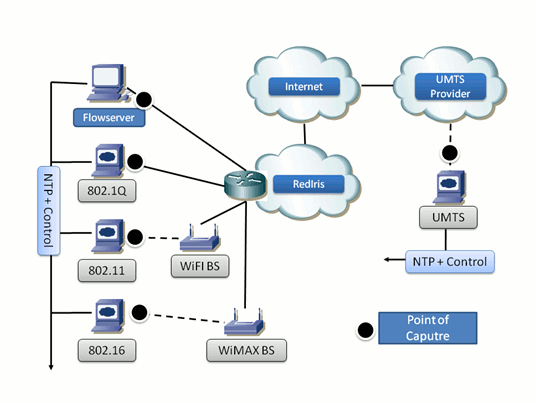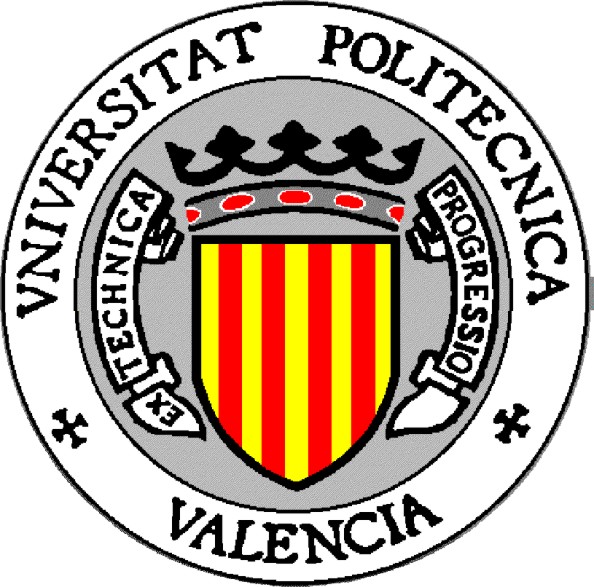CBA Website Archive (Until 2023)
Contact Webmaster
CEPS: Provisión de Servicios de Red Interdominio
Description
Several standardization bodies (UIT-T, 3GPP and IETF) are working on the definition of Next Generation Network Architectures based on “All-IP” and “Always Best Served” concepts. Key level of Architectures proposed by those bodies are organised around the service layer, which offers to applications support for integration, deployment and operation of the end user services. This service layer is based on the underlying IP transport layer which offers support for QoS, security, etc, supporting the next generation applications.
This project aims to define one Architecture for next Generation services provision, which enables the creation of a service centre. The Architecture will enclose key elements of architectures of main standardisation bodies, and will focus on the service layer over heterogeneous access network, including wireless, cellular and fixed networks. Associated to the proposed Architecture, a Service Centre will be defined and setting up, for delivering end-user services.
End-to-end service provision over heterogeneous IP networks, including facilities for bandwidth on demand, guarantied bandwidth, QoS support, multi-diffusion, interworking of IPv4 and IPv6 networks among others is not a well solved problem, mainly because the problems due to the different domain involved in the service provision. Most of the existing solutions for monitoring and traffic measurement are designed for a single domain, and just a few refers to inter-main scenarios (hierarchic scenarios). This research project aims to integrate three research areas (monitoring and traffic measurement, traffic engineering and routing) in the context of inter- domain service provision.
The development of electronic technology and radio software, among others, will determine that in the near future the operation of radio networks will be characterised by the availability of multi- technology terminals such as GSM/EDGE and WCDMA. In this scenario, the coordinated management of radio resources, minimising their usage and guarantying QoS requirements for the end users, will become a key point. The objective of the project id the design of new policies for controlling admission of new session en multi-access systems and multi-service scenarios, capable of adapting to changing traffic conditions and that allows exploiting information regarding future hand-hovers of new sessions. Those policies have to guaranty at least the next QoS objectives: the probability of blocking new sessions, the probability of shutting down existing sessions and the probably of outage.
Details
Wireless technologies have rapidly evolved and are becoming ubiquitous. An increasing number of users attach to the Internet using these technologies; hence the performance of these wireless access links is a key point when considering the performance of the whole Internet. At the CEPS project we are analyzing the performance of an IEEE 802.16 (WiMAX) client and an UMTS client. The measurements are being carried out in a distributed testbed between UPC, UPV and UPM:

All three universities are connected through RedIris, the Spanish academic research network (NLANR). The test-bed includes five terminals. Three of them are equipped with an IEEE 802.11, an IEEE 802.16 and an UMTS interface. Another one is equipped with an Ethernet (as reference). The last one is the Isabel flow-server. All the machines are Linux-based, at least Pentium III with 1GB of RAM. In order to measure the performance of such links we load the wireless access links with traffic from a multi-point videconferencing application and we measure three layer-3 metrics (One-Way-Delay, IP-Delay-Variation and Packet Loss Ratio).
Participants
This is a joint research project funded by the Spanish Ministry. The partners are the Technical Universities of Madrid (UPM), Barcelona (UPC) and Valencia (UPV).
 |
|
 |
The EPO (Ente Promotor Observador) are institutions or companies that are interested and support the research activity of the project. For UPC these are: CESCA , RedIRIS and TECSIDEL
Duration
31/12/2005 – 30/12/2008
Publications and Documents
The results of the experiments carried out at the CEPS project can be found at:
R. Cosma, A. Cabellos-Aparicio, J. Domenech-Benlloch, J. Gimenez-Guzman, J. Martinez-Bauset, M. Cristian, A. Fuentetaja, A. López, J. Domingo-Pascual, J. Quemada “Measurement-Based Analysis of the Performance of several Wireless Technologies”, IEEE LANMAN 2008 (PDF). The traces used in this article can be download here.
Rares Ioan COSMA, Albert Cabellos-Aparicio, Jordi Domingo-Pascual, “Measurement-Based Analysis of the Performance of several Wireless Technologies”, Technical Report 2008 (PDF )
Albert Cabellos-Aparicio, “Resultados de las pruebas estáticas distribuidas del proyecto CEPOS”, Technical Report 2008 (only available in spanish) (PDF)
Albert Cabellos, Jose Nuñez, Jordi Domingo “ Estudio de la Desincronización de un Reloj no Disciplinado mediante Pruebas Activas”, Technical Report 2008 (only available in spanish) (PDF)




